March 7 Speech: Hasina hails recognition by Unesco
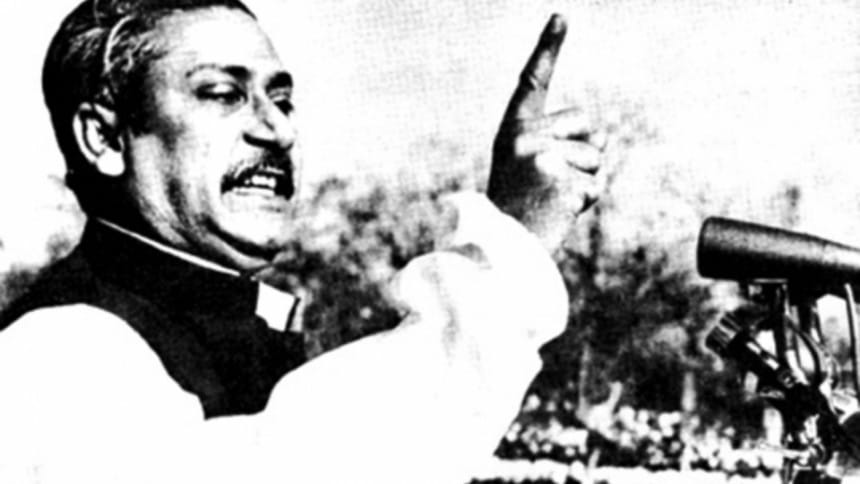
Prime Minister Sheikh Hasina yesterday said recognition of Bangabandhu's historic March 7 speech as a world documentary heritage by the Unesco is a matter of great pride for the Bangalee nation and Bangla language.
In a statement, she also termed the recognition another milestone in the continuation of global acclamation.
Bangabandhu's speech has been included in the Memory of the World International Register, a list of the world's important documentary heritage, maintained by the United Nations Educational, Scientific and Cultural Organisation (Unesco).
Unesco Director General Irina Bokova announced the decision at its headquarters in Paris on Monday.
On March 7, 1971, Bangabandhu Sheikh Mujibur Rahman in his fiery speech called on freedom-loving Bangalees to wage a decisive struggle against the Pakistani oppressors. The speech set the tone for the Liberation War that would officially begin later that month on March 26.
“Ebarer sangram amader muktir sangram, ebarer sangram swadhinatar sangram [The struggle this time is a struggle for emancipation, the struggle this time is a struggle for independence],” Bangabandhu proclaimed in a thunderous voice at a mammoth rally at the Racecourse Maidan (now Suhrawardy Udyan) that day.
"Turn every house into a fortress, resist the enemy with everything you have … Having mastered the lesson of sacrifice, we shall give more blood. God willing [Inshallah], we shall free the people of this land,” he went on to proclaim.
The speech touched every Bangalee's heart across the then East Pakistan, now Bangladesh, and mobilised the whole nation, excepting a few pro-Pakistani elements, to prepare for the Liberation War.
In the statement, Hasina said, "I'm extending my heartfelt thanks and gratitude to the Unesco and its director general and all concerned on behalf of Bangladesh and the Bangalee nation for including Bangabandhu's 7 March speech in the Memory of the World International Register."
The PM said the then West Pakistani rulers had started showing a "step-motherly" attitude towards Bangalees soon after the formation of Pakistan state in 1947 based on the two-nation theory. "In addition to economic exploitation, they attacked our language and culture."
She said the Pakistanis moved to make Urdu as the state language instead of Bangla, mother tongue of most of the people. "Father of the Nation Bangabandhu Sheikh Mujibur Rahman first put up a resistance against the oppressions of the Pakistanis and led a movement for sovereignty of the nation."
The PM said the Bangalees were subjected to oppression and intimidation for raising resistance against injustice. "As a continuation of the Language Movement, they took part in the election in 1954 under the banner of the Jukta Front, waged a movement in 1966 for an education policy, participated in the six-point movement, took part in mass upsurge in 1969 and exercised franchise in the general election in 1970."
"All the movements and the victory in the 1970 polls culminated in a logical and decisive conclusion through achieving freedom," she added.
According to international political analysts, Bangabandhu's 7 March speech is one of the best political speeches of the world and it had motivated the Bangalee nation to clinch victory in 1971, the PM added.
Hasina mentioned that the speech has made its place also in the book, "We Shall Fight on the Beaches: The Speeches that Inspired History", written by writer and historian Jacob F Field.
Meanwhile, at a meeting in Awami League president's Dhanmondi office last night, the ruling party planned a seven-day programme to celebrate the Unesco's recognition of the historic March 7 speech.
The programmes include placing of wreaths at Bangabandhu's portrait on November 3, broadcasting the March 7 speech and bringing out processions at educational institutions across the country on November 4 and arranging special prayers at religious institutions on November 5.
Besides, a rally will be held at Suhrawardy Udyan on November 9, said a party press release.

 For all latest news, follow The Daily Star's Google News channel.
For all latest news, follow The Daily Star's Google News channel. 

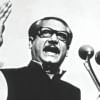
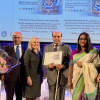
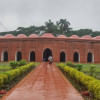
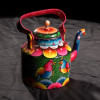



Comments